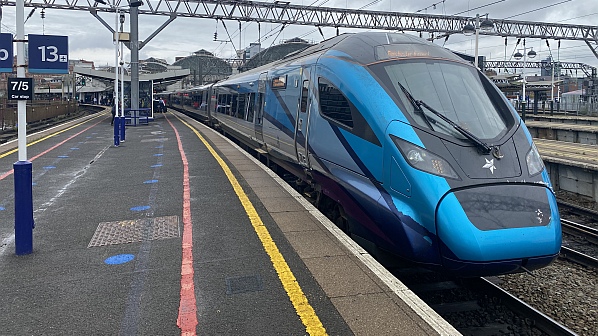BRITAIN’s National Audit Office (NAO) says that the Transpennine Route Upgrade (TRU) programme for the route between Manchester and York remains at risk of delays and cost increases, and it is not yet clear how its intended benefits will be achieved.
This is despite the project having been put on a firmer footing by the Department of Transport (DfT), which announced an increase in funding for TRU from £2.9bn to £9bn on July 19.
NAO published its report on TRU on July 20, having considered expenditure by DfT and Network Rail (NR) on the project to see if value for money has been achieved.
It says that DfT first announced its intention to upgrade the Transpennine route in 2011, and in November 2021 announced that it would be delivered as Phase One of the wider Northern Powerhouse Rail investment programme
NAO says that DfT has developed a clear case for investment, but has taken too long to decide how to upgrade the Transpennine route.
Prior to the Covid-19 pandemic, passenger-journeys at the route’s two main operators, TransPennine Express and Northern Rail, increased from 106 million in 2009-10 to 137 million in 2019-20, resulting in overcrowding and service unreliability.
Work on the TRU first started in 2015 but was paused. Since 2017 DfT has repeatedly altered the scope of the programme to meet differing ministerial priorities and budget constraints, and as a result £190m of the £1bn spent by NR on TRU has been on work that is no longer needed.
The scope of TRU includes providing four tracks between Huddersfield and Dewsbury to increase capacity for passenger and freight services and to improve reliability. In May 2021, DfT forecast that TRU will cost between £9bn and £11.5bn and will be completed between 2036 and 2041.
NAO says that negotiations between NR and train operators over track access during upgrade work will be difficult, creating a risk of delays. TRU will also need buy-in from local businesses and landowners for timely access to land and to agree development.
DfT has not yet committed to funding the rolling stock needed to achieve the full benefits of TRU, electric trains that are compatible with new signalling systems. “Until funding is confirmed there is no certainty that rolling stock will be at the required level,” NAO says.
On inflation costs, NAO says that DfT and NR have not yet agreed how sharp rises in the cost of energy and materials will be funded. It is also not clear if NR and its contractors will be able to fully address labour shortages, which may also increase costs.
NAO also points to research undertaken by consumer watchdog Transport Focus and NR that found that passengers were not aware of the upgrade work planned for the Transpennine route.
This creates a risk that passengers will switch to other forms of transport to avoid disruption during upgrade works and will not return to rail in the long term.
NAO says that NR is developing its communications strategy with operators and is pIanning a major marketing campaign this autumn. It is also minimising the use of rail replacement bus services throughout TRU as they are unpopular with passengers.
DfT and NR are taking reasonable steps to set up TRU for success, NAO says, including applying lessons from other major infrastructure projects. This is still at an early stage and the real test will come as construction work begins in earnest, but NAO would expect NR and DfT to know by this stage how success will be measured.
NAO finds that it has not been determined how TRU will be managed as part of Northern Powerhouse Rail “to ensure the benefits and connections between the two projects are fully aligned.”
It is also not yet clear if the design of TRU will provide long-term resilience to climate change.
NAO recommends that DfT and NR should set out how they will measure the benefits of TRU, such as reduced carbon emissions, and that they should also monitor the impact of disruption on passengers.
”Rail passengers in the north have contended with increasing overcrowding and delays for too long,” says Mr Gareth Davies, head of the NAO. “It is good that plans for TRU are now agreed, but there are still significant risks to the programme's progress that could cause further disruption.”
“DfT, NR and government must work together to manage these challenges and deliver the expected benefits for rail users,” Davies says.
For details on British infrastructure projects, subscribe to IRJ Pro.

